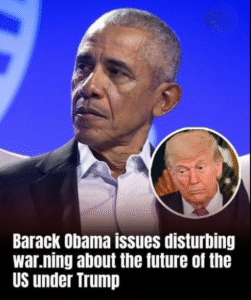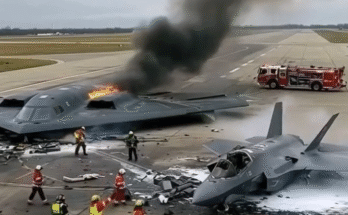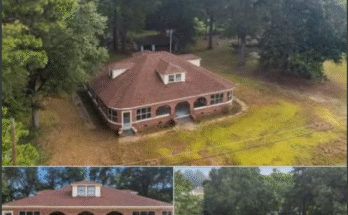Barack Obama Issues Disturbing Warning About the Future of the U.S. Under Trump
In a powerful and sobering speech that reverberated across the nation, former President Barack Obama issued one of his most urgent warnings yet about the direction of the United States under Donald Trump’s renewed political influence. Speaking at a public forum in Connecticut, Obama cautioned that America was “dangerously close to normalizing autocratic behavior” — a statement that has ignited both alarm and reflection among citizens and leaders alike.
The former president’s words were not shouted in anger but delivered with the quiet intensity that has long defined his public demeanor. Yet behind his calm tone was a message of deep concern — a fear that the democratic institutions and moral foundations that have guided the U.S. for centuries are now under unprecedented strain.
“Dangerously Close to Autocracy”
Obama began his remarks by addressing what he described as a slow but steady erosion of democratic norms. “When those in power begin to believe that rules don’t apply to them, when truth becomes negotiable, and when cruelty is worn as a badge of strength,” he said, “that is when democracy begins to fade.”
He drew comparisons to governments in other parts of the world that have kept the outward appearance of democracy — elections, parliaments, political parties — while hollowing out the freedoms that give those systems meaning. “We are not there yet,” he warned, “but we are dangerously close to normalizing behavior that would once have been unthinkable.”
Without naming Trump directly at first, Obama described a culture of intimidation, misinformation, and disregard for accountability. He spoke of leaders who “demand loyalty to a person rather than the Constitution,” who use their platforms to “divide people by race, religion, and resentment,” and who treat dissent as betrayal rather than civic participation.
It was only later, when asked about Trump’s potential return to the White House, that Obama became more explicit. “The issue is not one man,” he said, “but a movement that encourages citizens to believe that strength lies in domination rather than cooperation. That’s not democracy. That’s how democracies die.”
A Call for Vigilance
Obama’s warning was not only a critique — it was a call to action. He urged Americans, particularly younger generations, to resist complacency and cynicism. “You have every right to be impatient with injustice,” he said. “You should be angry when you see cruelty or corruption excused. But don’t withdraw. Don’t give up on this country. Democracy depends on participation — it depends on you.”
He reminded the audience that democracy has always been fragile, even in America’s earliest days. The founders, he said, understood that power left unchecked would eventually corrupt. “They built guardrails — checks and balances, free speech, a free press, independent courts — but those guardrails only work if we, the people, care enough to maintain them.”
Obama emphasized that the threat to democracy does not come all at once, but in gradual steps. “It doesn’t happen with tanks in the streets,” he said. “It happens when we start accepting lies as truth, when bullying replaces debate, when we silence our neighbors instead of listening to them. That’s how it starts — quietly, and with the consent of those who choose not to speak.”
The Shadow of Division
One of the most haunting parts of Obama’s address came when he reflected on how deeply divided the nation has become. He lamented that too many Americans now live in “separate realities,” consuming information that confirms their fears instead of their hopes.
“When people stop agreeing on basic facts, democracy becomes impossible,” he said. “You can’t have a functioning republic when half the country believes the other half are enemies. We can disagree — we must disagree — but we have to share the same reality.”
He warned that such polarization is not an accident but a strategy. “There are those who benefit when we hate each other,” he said. “Division is profitable. Outrage is a business model. And the more we fight amongst ourselves, the less attention we pay to the powerful interests that manipulate the system for their own gain.”
Obama’s voice grew firm as he called for a return to empathy and civic decency. “Democracy is not just a system of government — it’s a habit of heart. It’s the willingness to see yourself in another person’s shoes, to recognize that your neighbor’s freedom is tied to your own.”
A Warning from Experience
As the first Black president in U.S. history, Obama has faced intense scrutiny, hostility, and waves of disinformation. Yet, even his critics acknowledge that his perspective carries weight because he has witnessed firsthand how fragile democratic norms can be under political pressure.
He described how, during his presidency, he felt constant tension between governing for the whole country and managing partisan hostility. “Even then,” he said, “I worried about what would happen if someone came along who didn’t respect the limits of power — who saw division not as a challenge to overcome but as a tool to exploit.”
While Obama never directly accused Trump of dictatorship, his meaning was unmistakable. He painted a picture of a country where institutions have been weakened, truth distorted, and public trust eroded — all conditions that can lead to authoritarian rule if left unchecked.
“We Still Have a Choice”
Despite the grim tone of his warnings, Obama ended his remarks on a note of cautious optimism. “History doesn’t move in a straight line,” he said. “There are moments when it bends toward justice — and moments when it bends away. But it always bends according to what we do, what we stand up for, what we’re willing to protect.”
He pointed to young activists, community organizers, teachers, and local leaders as the “true guardians of democracy.” He said that while the federal government often dominates headlines, “real democracy” happens in neighborhoods, schools, and local communities — wherever ordinary citizens come together to solve problems without waiting for permission from the powerful.
Obama’s message was clear: democracy cannot survive on autopilot. “Freedom is not self-sustaining,” he said. “It requires constant renewal — through courage, through compassion, through truth.”
Reactions Across the Nation
The former president’s remarks drew swift responses from across the political spectrum. Supporters praised his courage and clarity, calling his speech “a wake-up call for America.” Many said it was a reminder that defending democracy isn’t just about politics — it’s about values.
Critics, however, dismissed his warning as alarmist or politically motivated. Some accused him of fearmongering to influence future elections. Yet even among skeptics, there was an acknowledgment that the tone of American politics has grown darker and more volatile.
Political analysts noted that Obama’s speech tapped into a growing unease across the country. With rising political violence, deep mistrust in institutions, and relentless misinformation, many Americans — regardless of party — sense that something foundational is at stake.
The Takeaway
In the end, Obama’s “disturbing warning” was less a prediction than a plea: a call for Americans to remember who they are and what they stand for. He urged the nation not to surrender its principles to the temptation of fear or the illusion of strongman leadership.
“The question before us,” he said in closing, “is not whether democracy will survive — it’s whether we will choose to protect it. Every generation has faced that test. Now it’s our turn.”
As the audience rose in applause, Obama’s words lingered like a quiet echo of history itself — a reminder that the fate of American democracy, once again, rests not in the hands of one man, but in the hearts of millions.


